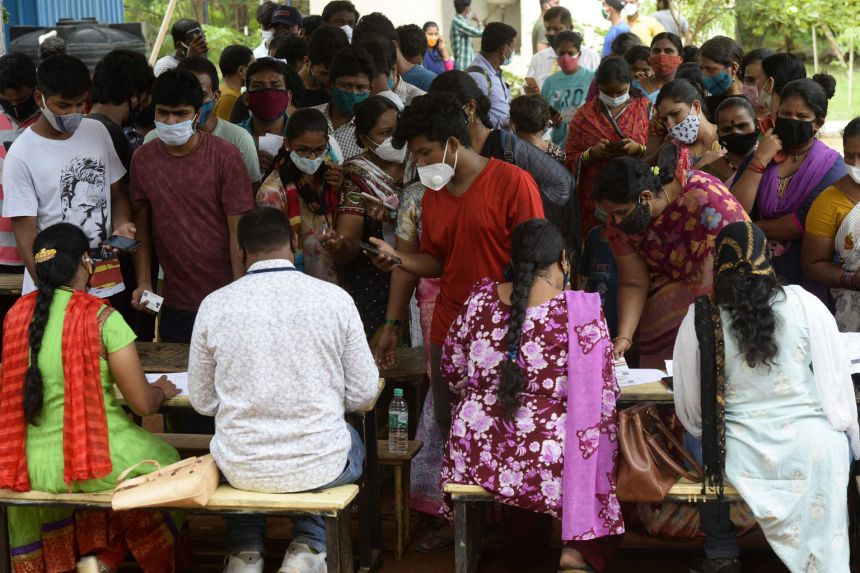Thousands jabbed with unknown substances at fake Covid-19 vaccination camps in India
Sign up now: Get insights on Asia's fast-moving developments

Residents lining up to register for a dose of the Covaxin vaccine during a vaccination drive at a school in Hyderabad on July 1, 2021.
PHOTO: AFP
Follow topic:
NEW DELHI - An Indian Member of Parliament is among thousands of unsuspecting individuals who fell victim to a spate of fake vaccination camps that have exploited the heightened demand for Covid-19 jabs in the country in recent weeks.
Held in Mumbai, Thane and Kolkata, these camps have shocked a country that just a few weeks ago had seen scammers profit during a calamitous second wave of infection by selling fake medicine and even fire extinguishers that were passed off as oxygen cylinders.
While the first such reported camp was organised on May 30 in Mumbai, one was held as recently as June 22 in Kolkata.
Several arrests have been made in the two cities, with the police booking the accused on serious charges, including culpable homicide not amounting to murder.
As investigations continue, the focus remains on identifying the substance used in the counterfeit jabs. The police in Mumbai suspect that saline or distilled water, refilled in used vaccine vials, was administered to the victims.
In Kolkata, there are lingering concerns around the possible use of amikacin, an antibiotic used to treat infections of the urinary tract.
MP Mimi Chakraborty, who was invited to one such fake camp in the city and received a suspected spurious jab there on June 22, fell ill soon after, although it is not known if her illness was caused by the substance she had received.
Mr Hiren Mehta, 35, and his wife were among those who were duped at a fake camp in Mumbai on May 30. While they did not experience any side effects afterwards, they are worried and angry.
"Our main concern is what they have injected into our body. And then to find out when we can get our first dose because the third wave is approaching," he told The Straits Times.
Experts in India have warned of a third wave of the pandemic, with some suggesting it could hit the country as early as in the next eight weeks.
The Mehtas even received a fake certificate from the government vaccination portal, which the scammers had managed to hack into, stating they had been jabbed, and that now prevents them from getting vaccinated.
The High Court of Bombay on June 29 asked local authorities in the city to ascertain what was administered to around 2,000 victims of such camps in Mumbai, and ensure that they are now duly vaccinated.
Covid-19 vaccinations at private centres are not free, and many individuals, including Mr Mehta, paid as much as 1,260 rupees (S$22.80) per jab at some of these camps.
The sophisticated scam operations unravelled after individuals complained to the police.
Many of them became suspicious after they had no ill effects from the shots and failed to receive government vaccination SMS alerts and certificates.
Investigations so far have revealed devious means to fool people. The alleged kingpin arrested in Kolkata, Debanjan Deb, 28, is said to have posed as a civil servant with a postgraduate degree in genetics.
Police recovered forged labels of Covishield, one of the vaccines being used in India, and vials of amikacin with no expiry date printed on them, from his house.
To establish his credentials, Deb would allegedly print out letters addressed to various government agencies and mark them with fake government stamps to claim they had been received and acknowledged by the authorities.
He is suspected of being behind eight spurious vaccination camps in the city that jabbed around 1,000 individuals.

<p>ddscam.<br/>Debanjan Deb, who conducted dubious vaccine camps in Kolkata. Credit: Twitter/@Abhijit_Basak83 </p>
PHOTO: ST
In Mumbai and Thane, camps were organised at some nine locations, and victims included people from an upscale residential complex, as well as employees from a Bollywood film production firm.
Investigations revolve around a hospital that is believed to be the source of the used vaccine vials.
Stronger checks have been put in place to prevent further instances of fake vaccination drives.
Following recommendations from a committee set up on June 26 by the West Bengal government, it is now mandatory for private health facilities and workplaces in the state to seek approval from the health department before organising a vaccination camp.
All private Covid-19 vaccination centres have also been asked to maintain a "dynamic inventory of vaccines" that discloses the source of their supplies, cold chain maintenance mechanisms, and day-to-day consumption of vaccine doses, all of which must be conveyed daily to the health department.
Dr Santanu Tripathi, a member of the committee, told ST that such camps have to be held under proper government vigilance to prevent unscrupulous people from misusing the public drive to get people vaccinated.
"Within a short span of time, many people have to be vaccinated. And now, some degree of awareness has been generated on how necessary it is to be vaccinated. So, parallel to that, access (to vaccines) should also be optimised," he added.
After widespread vaccine shortages, the supply situation has eased somewhat, with India administering more vaccine doses in the last two weeks than the number of people who signed up for shots during the period, according to a Reuters report on Tuesday (June 29).
India's vaccination drive, which began on Jan 16, has made modest progress, with around 59.6 million individuals fully immunised up to Wednesday, in a country of more than 1.3 billion people.

